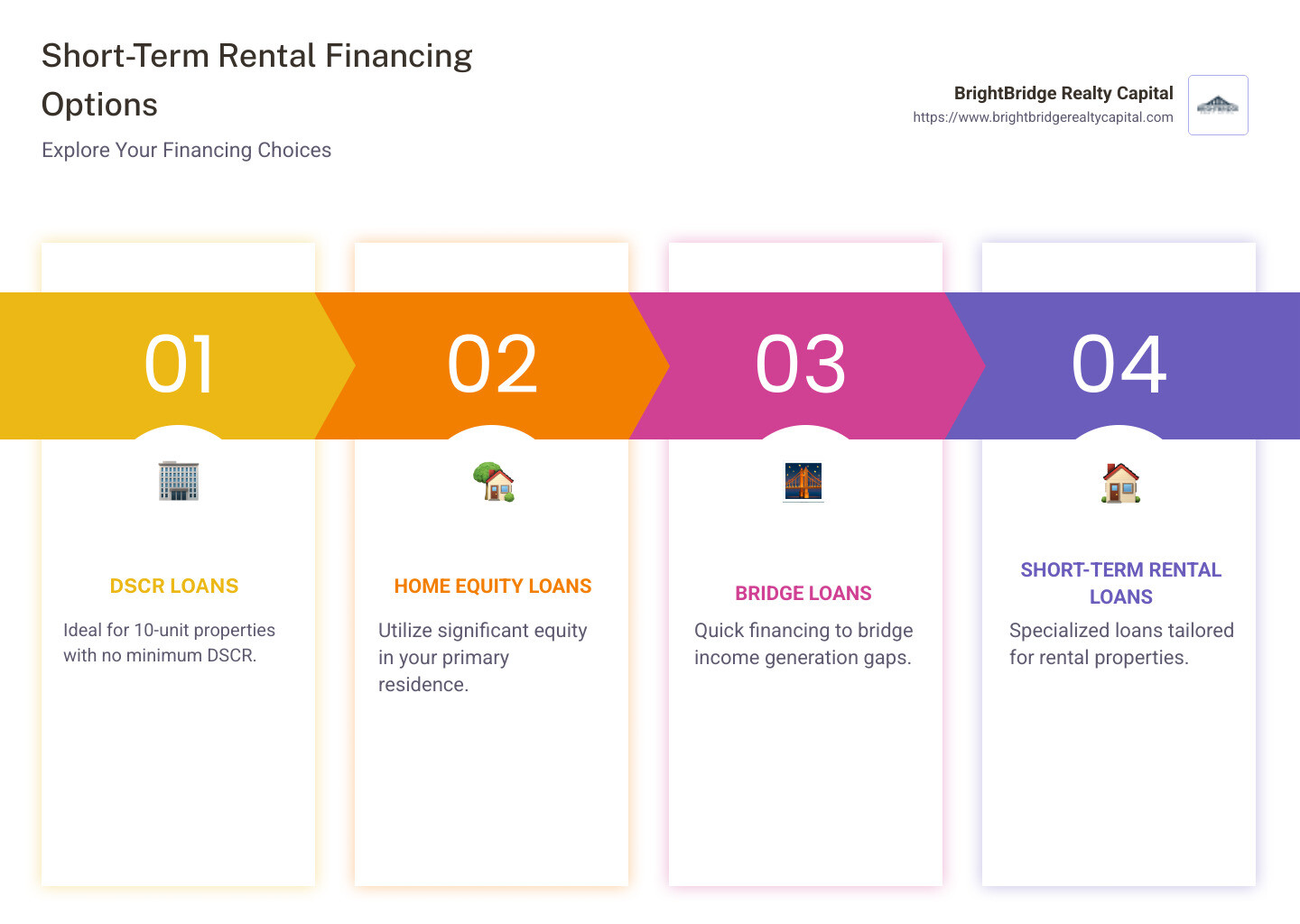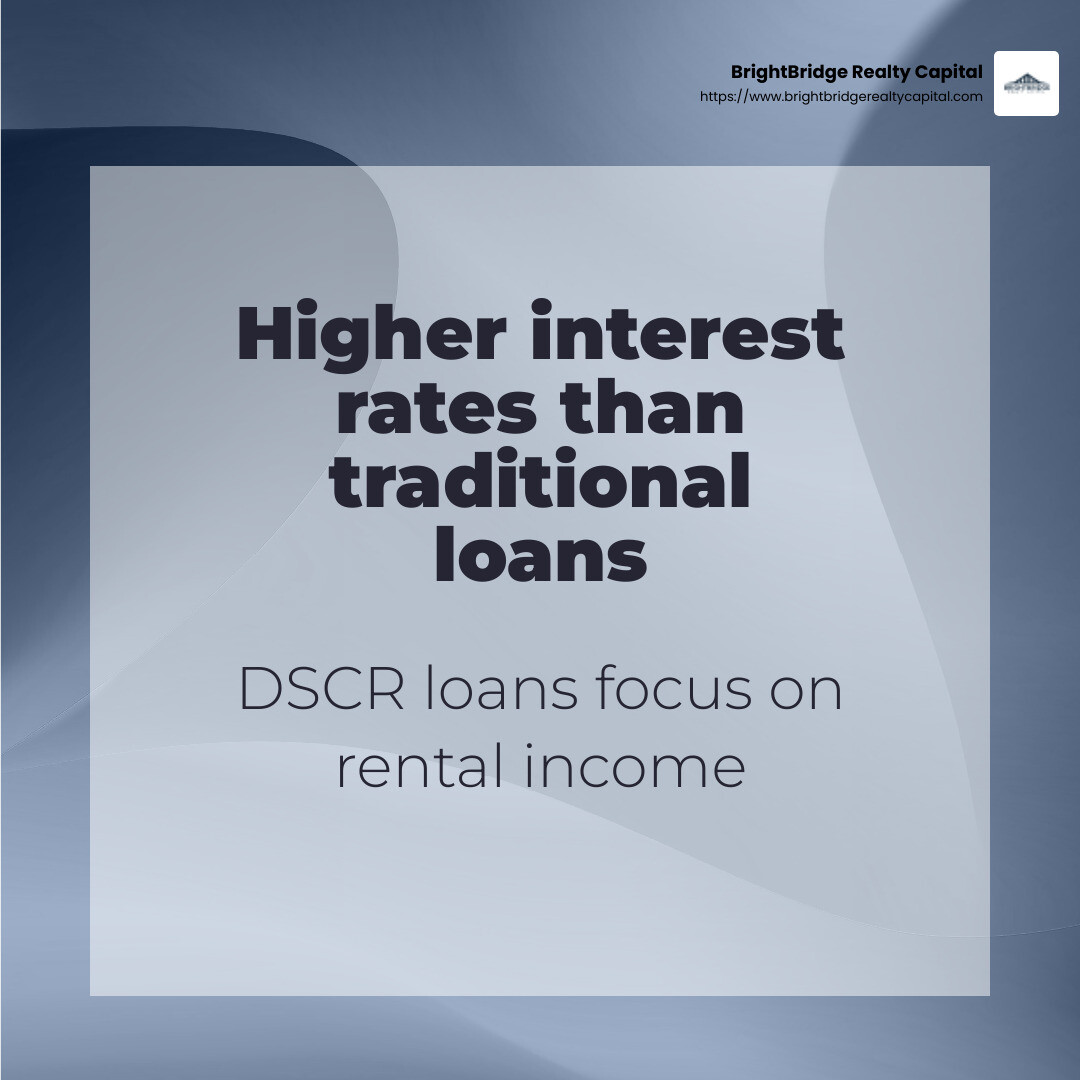Unlocking the Door: A Guide to Financing Short-Term Rentals

Financing for short term rental properties is a crucial stepping stone for any real estate investor eager to dive into this lucrative market. Short-term rentals, such as those listed on platforms like Airbnb, offer significant potential for returns. However, the initial hurdle often involves securing the right financial backing. Here's a quick look at some key points to keep in mind:
- Explore DSCR Loans for up to 10-unit properties with no minimum DSCR.
- Consider home equity loans if you have significant equity in your primary residence.
- Understand bridge loans for quick financing to bridge the gap between investment and income generation.
As an investor, engaging in short-term rental business means recognizing the marriage between investment properties and real estate financing. These ventures are not just ways to fill vacancies but opportunities to transform properties into cash-generating assets.
The dynamic world of real estate financing is brimming with unique avenues like short-term rental loans, DSCR loans, and even innovative strategies such as AirBnBRRRR. Each comes with distinct benefits and considerations, amplifying your potential to expand your rental portfolio swiftly and strategically.
Understanding this landscape is essential for capitalizing on existing opportunities, ensuring you can secure favorable terms and maintain robust investment returns.

Glossary for financing for short term rental properties:
Understanding Short-Term Rental Financing
Key Considerations
When diving into financing for short-term rental properties, understanding the types of loans available is crucial. These loans are custom for properties that will be rented out for short stays, often through platforms like Airbnb. Let's break down the options and considerations involved:
Airbnb Loans vs. Vacation Rental Loans
Both Airbnb and vacation rental loans fall under the umbrella of investment property loans. They are designed for properties rented on a short-term basis. Whether you're listing on Airbnb, VRBO, or other platforms, the loan structures remain largely similar. They focus on the property's income potential rather than the borrower's personal income. This shift allows for more flexibility in securing financing.
Investment Property Loans
Investment property loans are broader and can apply to both short-term and long-term rental properties. These loans typically come with higher interest rates due to the perceived risk. Lenders may require a more substantial down payment and a stronger credit score compared to primary residence loans.
Risk Tolerance
Your risk tolerance is a key factor when considering short-term rental financing. Short-term rentals can yield high returns but also come with unpredictability. Seasonal variations and occupancy rates can impact your income. It's essential to weigh these risks against potential rewards.
Economic Climate
The economic climate plays a significant role in financing decisions. Interest rates fluctuate based on market conditions, affecting loan affordability. Keeping an eye on economic trends can help you time your investment to secure better loan terms.
Loan Types
There are several loan types to consider:
Home Equity Loans: Tap into the equity of your primary residence to finance your rental property. This option can offer lower interest rates but requires you to have significant equity already built up.
DSCR Loans: These loans focus on the Debt Service Coverage Ratio, which evaluates the property's income against its debt. It's a preferred option for properties with strong rental income potential.
Bridge Loans: Short-term loans that provide quick cash flow solutions. They are ideal for investors needing immediate funding while waiting for longer-term financing.
Each loan type has its pros and cons, making it vital to align your choice with your financial goals and risk profile.
Navigating the landscape of short-term rental financing involves understanding these key considerations. By evaluating loan types, assessing risk, and keeping an eye on the economic climate, you can make informed decisions that align with your investment strategy.
Financing Options for Short-Term Rentals
When it comes to financing for short-term rental properties, you have several options. Each has its own benefits and considerations. Let's explore the three main types: Home Equity Loans, DSCR Loans, and Bridge Loans.
Home Equity Loans
Home equity loans allow you to borrow against the equity you've built in your primary residence. This can be a great way to finance a short-term rental property, especially if you have significant equity.
How It Works: You receive a lump sum based on the equity in your home. This loan is secured by your property, which often results in lower interest rates compared to unsecured loans.
Ideal For: Homeowners with substantial equity who want to venture into short-term rentals like Airbnb. It's a good option if you're looking to make a significant down payment or purchase outright.
Considerations: Your home is collateral. Failure to repay could lead to foreclosure. Also, tapping into your home equity means you're putting your primary residence at risk.

DSCR Loans
Debt Service Coverage Ratio (DSCR) Loans are custom for investment properties, focusing on the property's income potential rather than personal income.
How It Works: Lenders look at the rental income of the property to ensure it can cover the debt payments. This makes these loans attractive for properties with strong income potential.
Ideal For: Investors who want to leverage rental income to secure a loan. It's particularly useful for those with multiple properties or those looking to scale their rental portfolio.
Considerations: DSCR loans often have higher interest rates than traditional loans due to the perceived risk. However, they offer flexibility by not requiring personal income verification.

Bridge Loans
Bridge Loans are short-term loans designed to provide immediate financing while you secure long-term funding.
How It Works: These loans offer quick cash flow solutions, ideal for purchasing a property quickly or making necessary renovations. They "bridge" the gap between buying and securing permanent financing.
Ideal For: Investors needing fast access to cash. They are useful when you need to act quickly in competitive markets or when you're waiting for another property to sell.
Considerations: Bridge loans typically have higher interest rates and fees. They are meant to be temporary solutions, so ensure you have a plan for long-term financing.

Each of these financing options offers unique advantages depending on your situation and investment strategy. Whether leveraging home equity, maximizing rental income, or securing fast short-term cash flow, understanding these options can help you make informed decisions as you steer short-term rental investments.
Steps to Secure Financing for Short-Term Rentals
Once you've decided on the best financing option for your short-term rental property, it's time to steer the application process. Here's a step-by-step guide to help you secure that financing smoothly.
Application Process
1. Start with an Application
Begin by filling out a loan application. This is where you provide basic details about yourself and the property you're interested in. It's important to be thorough and accurate.
2. Connect with an Account Executive
An Account Executive (AE) will be your main point of contact. They will guide you through the process and ensure you understand each step. Your AE will also help you gather necessary information and answer any questions you may have.
3. Pay for an Appraisal
An appraisal is crucial. It determines the property's market value and ensures it meets the lender's criteria. You'll need to cover the cost of this appraisal upfront. The appraisal helps the lender assess the risk of the loan.
4. Work with a Loan Processor
Once your application is submitted, a loan processor steps in. They gather additional documents and ensure everything is in order. The processor works closely with both you and the underwriters to keep the process moving.
5. Underwriting and Approval
Your processor submits the complete loan package to the underwriting team. They evaluate your credit and the property's potential to generate income. Approval means you're one step closer to closing.
6. Schedule Your Closing
After approval, the Processor and Account Executive will schedule your loan closing. This is when you sign the final documents and seal the deal.
Documentation Requirements
To streamline the process, you'll need to prepare a set of essential documents. Here's what you typically need:
- Identification: A valid form of ID for every guarantor involved in the loan.
- Insurance Declaration Page: Proof of insurance coverage for the property.
- Purchase Contract: The contract for the property purchase, along with any addendums.
- Voided Check: For setting up payments.
- Title Company Contract: If applicable, this outlines the title company's role.
- Business Entity Documents: Required if you're borrowing through a company.
- HOA Contact Information: If the property is part of a Homeowners Association.
- Current Lender Information: Only if you're refinancing.
Having these documents ready can help avoid delays and ensure a smooth application process. Each piece of documentation plays a critical role in verifying your eligibility and the property's viability as a short-term rental investment.
By following these steps and preparing the necessary documentation, you can efficiently steer the process of securing financing for your short-term rental property. Next, let's address some common questions about financing options.
Frequently Asked Questions about Financing for Short-Term Rental Properties
Navigating financing for short-term rental properties can be tricky. Here are some common questions to help you better understand the process and requirements.
What is the minimum down payment required?
When you're looking to finance a short-term rental property, the minimum down payment often depends on the type of loan you choose. Typically, lenders require a down payment ranging from 15% to 20% of the property's purchase price. This is higher than the 3% needed for a primary residence, reflecting the increased risk associated with investment properties.
Can I use projected income from short-term rentals?
Yes, you can use projected income from short-term rentals to qualify for a loan. Some lenders, including those offering Debt Service Coverage Ratio (DSCR) loans, allow you to use documented rental income from platforms like Airbnb or VRBO to demonstrate the property's income potential. This can be particularly beneficial if you don't have a traditional income stream to showcase.
Are there no-down-payment options available?
While no-down-payment options are rare for short-term rental properties, there are creative financing strategies that may minimize upfront costs. For instance, if you have significant equity in another property, you might consider a home equity loan or line of credit to fund your down payment. Additionally, some government-backed loans, like FHA or VA loans, might offer lower down payment requirements if the property meets specific criteria, such as being a multi-unit dwelling where you reside in one unit.
Understanding these aspects of financing will empower you to make informed decisions when investing in short-term rental properties. In the next section, we'll explore how BrightBridge Realty Capital can offer customized solutions and fast closings to support your investment journey.
Conclusion
When it comes to financing for short-term rental properties, BrightBridge Realty Capital stands out with its custom solutions and rapid closing process. We understand that every investor's needs are unique, and we're committed to providing flexible funding options to help you seize opportunities as they arise.
Our approach is simple yet effective. We cut out the middleman, allowing us to offer competitive rates and a seamless process. This means you can secure financing quickly—often within a week—without the usual hassles of traditional lending. With BrightBridge, you get direct access to funds, enabling you to focus on growing your rental portfolio.
Whether you're eyeing a new Airbnb investment or looking to expand your existing properties, our team is here to guide you every step of the way. We pride ourselves on delivering not just loans, but solutions that align with your investment goals.
Ready to open up the potential of your next short-term rental investment? Explore our customized financing options and experience the BrightBridge difference today.


